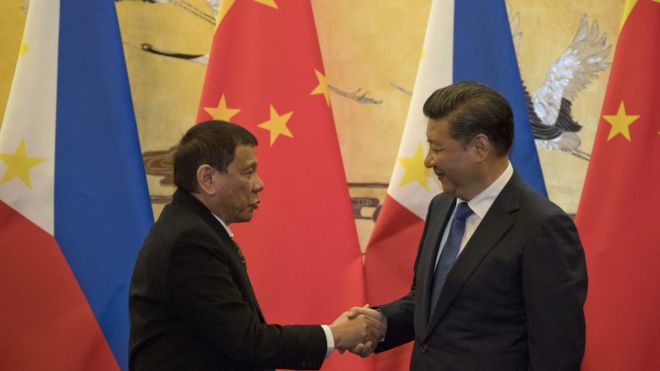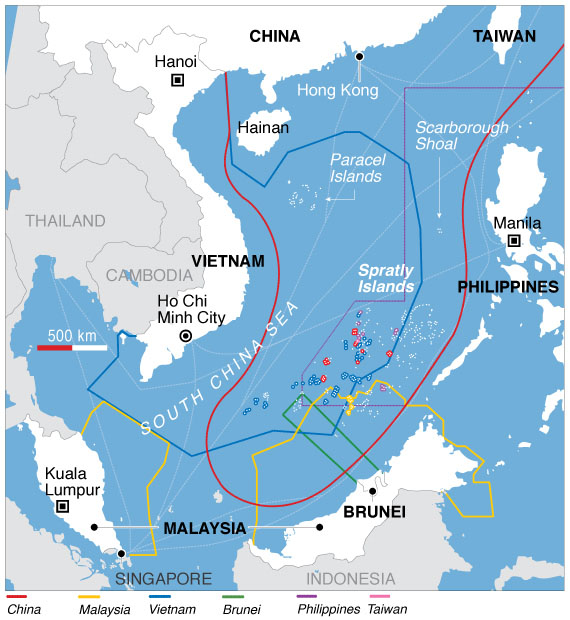
China warned it would go to war if Manila acted in accordance with The Hague’s arbitration on the South China sea by drilling for oil, President Duterte said yesterday (Friday, April 19).
Although bilateral talks on the disputed waters have been announced, the claim by the president cast a clear light on the importance Beijing places on its unilateral claim to the bulk of the maritime region.
The claimed warning — which Beijing has not confirmed — also brings into sharp focus the policy dilemma for the USA, which seeks to maintain naval dominance in the Pacific in the face of China’s militarisation of the South China Sea, including the construction of artificial islands.
In a ruling last July, the Permanent Court of Arbitration, based in The Hague, rebuked China for its behaviour in the South China Sea and dismissed its claim of sovereignty over swathes of the waters.

Despite this clear ruling, there is no legal mechanism for enforcement, so Beijing has simply disregarded it.
In his speech to coast guard officers in Davao on Friday, the president claimed that President Xi Jinping had warned him against trying to enforce the ruling.
He also told his audience that he said to President Xi: “We intend to drill oil there, if it’s yours, well, that’s your view, but my view is I can drill the oil, if there is some inside the bowels of the earth, because it is ours.”
He then recounted President Xi’s reply, saying he said: “We’re friends, we don’t want to quarrel with you, but if you force the issue, we will go to war.”
The president’s national security adviser Hermogenes Esperon, said the leaders discussed the issue during a recent meeting in Beijing on China’s “One Belt, One Road” trade and investment initiative.
Parts of the South China Sea are also claimed by Brunei, Indonesia, Malaysia, Taiwan and Vietnam. The tribunal in The Hague tribunal backed Philippine sovereign rights within its 200-mile exclusive economic zone (EEZ).
The president’s remarks came just a day after China and the Association of Southeast Asian Nations (ASEAN) agreed in principle to push for a draft framework of a “code of conduct” to govern actions in the region.
“The Philippines welcomes the finalisation by ASEAN and China senior officials of the draft of the framework of the code of conduct,” the Philippine Foreign Ministry has said, but without providing any details.
The ministry added that the Philippines and China had affirmed the importance of “maintaining and promotion of peace and stability, freedom of navigation in and overflight above the South China Sea, addressing their territorial and jurisdictional disputes by peaceful means.”
President Duterte has played down the conflict since taking office, preferring to reach out to China while distancing himself of his country’s traditional ally the USA.
However, in his latest speech on the matter he warned that a war with his new ally China would “result in massacre” and “destroy everything.”
Since the president’s speech, Supreme Court Associate Justice Antonio Carpio today called for Manila to file a new international arbitration case and a complaint with the United Nations over the apparent threat of war. He said the use or threat of force to settle disputes between states is outlawed under the UN Charter and if the president did nothing to protest that, he was “selling us out”.
Carpio, who was part of the legal team that made the case in The Hague, said Xi’s threat was a “gross violation” of the UN Charter, the UN Convention on the Law of the Sea (UNCLOS), and the Treaty of Amity and Cooperation in Southeast Asia, to which China and the Philippines are parties.
“The Philippines’ recourse is to bring China’s threat of war to another UNCLOS arbitral tribunal,” he said.
“The president cannot simply do nothing, or worse acquiesce to China’s action, for inaction is the opposite of protecting Philippine EEZ.”

Comments are closed.